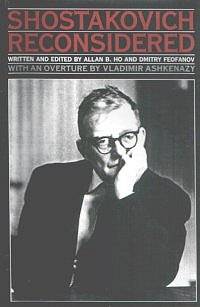 |
|

This is a wonderful book, packed with anecdotes, insights, and and information
about one of the major enigmas of our time.
The format itself is unconventional, and much of the space is devoted to
examining and ultimately justifying the accuracy of the views of Shostakovich
as depicted in Testimony, Shostakovich's memoirs as related to Solomon Volkov.
Testimony, of course, created a major furore when it was published shortly
after Shostakovich's death, and Volkov was subjected to a tirade of hostile
comment from the Soviet communist press, party, and from many pro-Soviet
members of the critical and musical establishment in the West. Indeed, many
politically uncommitted observers had great difficulty in believing the picture
that Testimony painted, a picture of an oppression so grim and frightening
as to be inconceivable to those fortunate enough never to have experienced
such a malign environment.
Although familiarity with Testimony clearly assists appreciation,( I hesitate
to use the term enjoyment about anything so harrowing), Shostakovich Reconsidered
provides an experience which can be illuminating on a number of different
levels. It is a work of enormous scholarship, packed with a host of references
from other books and articles, which must surely be of considerable interest
to both historians, musical commentators and musicologists whatever their
political persuasions. Then again, on a much less informed level, which happens
to be my own as someone who doesn't read music, who doesn't claim to understand
music, but who derives enormous pleasure and inspiration from simply hearing
and feeling music, this book provides a multitude of insights into the underlying
motives and messages which previously may only have been sensed even if not
understood. Another level of appreciation must be that which can only be
accessible to those who have actually lived under the type of regime which
Shostakovich himself endured. I believe that those of us fortunate enough
to have been brought up in the relatively benign environment of Western Europe
or the United States cannot possibly comprehend the malevolence of life lived
under such tyranny, although one need look no further than Bosnia to realise
that tyranny and evil are still potent forces in today's world. Wanting to
understand cannot itself be enough. The greatest depth of understanding,
surely can only come from those whose misfortune it has been to be subjected
to the experience. And this book includes many contributions from people
who, apart from being distinguished artists and close associates of Shostakovich,
did themselves live that experience. Familiar names include Vladimir Ashkenazy,
Mstislav Rostropovich, Maxim Shostakovich, Yevgeny Yevtushenko, Kirill
Kondrashin, and Semyon Bychkov.
As a mere lover, rather than a scholar of Shostakovich's work, I confess
to being gratified to find confirmation of the great man's view, as expressed
in Testimony that : "I write music, it's performed. It can be heard, and
whoever wants to hear it will. After all, my music says it all. It doesn't
need historical and hysterical commentaries. In the long run, any words about
music are less important than the music. Anyone who thinks otherwise is not
worth talking to". It is therefore perhaps, not so surprising that his
music should have the ability to communicate over such a broad spectrum of
musical sophistication.
As is probably clear, I have been an ardent admirer of Shostakovich's music
for many years, initially after having heard for the first time the 5th Symphony;
and it was also Shostakovich whose 8th String Quartet revealed to me the
power and the passion that can be achieved by the relatively puny resources
of chamber ensembles.( Incidentally, the section of the book devoted to that
particular work is one example of many which reveal an origin widely different
from that which previously was generally accepted). Once my interest was
triggered I have subsequently become familiar with most of his recorded works,
although I confess to finding less to enjoy in the film music and the various
dance suites. However, in recent years I have increasingly explored more
and more the byways of other 20th century music where, although I have stumbled
across the occasional gem, I almost invariably find that by comparison there
are too many notes, and the "rightness" of the musical progression is not
nearly as irresistible. With Shostakovich, to my ears even the most heavily
scored passages display an economy which is all too absent from lesser pens,
and even the gaps between the notes can speak volumes.
That of course is a totally personal and subjective view. A friend whose
musical tastes are completely different from mine, disparages Shostakovich
, and claims that all music should only be judged in "purely musical terms",
whatever that means. He also believes that the environment which composers
inhabit, and their non-musical experiences, should not colour what they write.
I happen to disagree most strongly, but he's entitled to his point of view,
and if you too share such a viewpoint then perhaps much of the content of
this book would be an irrelevance to you.
If, however, you believe that the experience of life is vital to the making
of the man and to the creation of his art, then I am sure that, regardless
of your level of musical appreciation you will find Shostakovich Reconsidered
approachable, fascinating , and illuminating, containing as it does such
a wealth of facts, anecdotes and observations, not all of them necessarily
flattering, about one of the most notable musical figures of our, or indeed
any, century.
Reviewer
David Dyer
Javascript Return
|
Reviewer
David Dyer
Reviews from previous
months
Reviews carry sales links but you can also purchase
from:




 |
